Iranian President Threatens To Destroy Israeli Cities

President Ebrahim Raisi has threatened to destroy the Israeli cities of Tel Aviv and Haifa in an inflammatory speech in Tehran.

President Ebrahim Raisi has threatened to destroy the Israeli cities of Tel Aviv and Haifa in an inflammatory speech in Tehran.
Speaking at a military parade for Army Day on Tuesday, he said: “The enemies, especially the Zionist regime, have received this message that the smallest action against Iran will result in a response from the armed forces and will lead to the destruction of Haifa and Tel Aviv.”
Raisi also demanded that US military forces quit the region, saying: “The presence of foreign forces threatens the security of the region, but the Iranian armed forces provide security wherever they are.
"The sooner they leave, the better it will be for the people of the region.”
Raisi’s speech is only the latest in a stream of chilling threats made by the Iranian regime against Israel. Apocalyptic warnings of “wiping Israel off the map” have been met with alarm by both Israel and the international community.
However, despite the alarming rhetoric, Israel’s intelligence military superiority is borne out by a long history of attacks carried out successfully against Iranian nuclear and military facilities. In recent years, Israel has launched air strikes against Iranian military sites in Syria and also inside Iran.
The inability of Iran to defend itself against these attacks has exposed how it lacks Israel's level of technology and resources.
Raisi’s inflammatory threats follows a flare-up of violence in the region, where Iran's allies and proxy forces among militant Palestinians, the Lebanese Hezbollah and forces based in Syria launched multiple rocket attacks earlier this month.
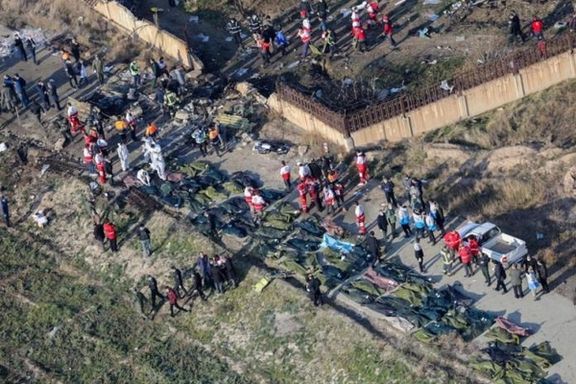
Families who lost loved ones in the downing of a Ukrainian passenger plane in 2020 are outraged by light sentences issued for a few low-ranking military men.
“Is this Islamic justice? A trash bin was burned [during protests], and a young man was executed [for that]. By deliberate shooting of two missiles 176 individuals and an unborn baby were killed and it resulted in thirteen years of prison for someone whose role in this case is not clear,” Beheshteh Rezapour who lost her 33-year-old daughter, in the tragic incident said in an interview with Iran International TV.
“So, commanders, those who issued the order, where do they stand in this case?” she added.
Mehrdad Zarei whose eighteen-year-old son Arad died in the incident in a video released on social media accused Supreme Leader Ali Khamenei, IRGC Commander Hossein Salami, Amirali Hajizadeh, the head of the IRGC aerospace force, Ali Shamkhani, secretary of the Supreme National Security Council and other military and government officials of responsibility for the downing and said they should be put on trial by an independent international tribunal or “after Iran's freedom”.
Some journalists and activists have also criticized the court process and the ruling.
Political activist Abdollah Momeni in a tweet pointed out that activist Mehdi Mahmoudian and women's rights activist Bahareh Hedayat are currently serving the same sentence as the unnamed top defendant in the Ukrainian flight case, only for lighting candles at a rally to honor the memory of the victims of the incident. “This is exactly what judicial justice is in the Islamic Republic!”
“Those who were killed in the shooting down of the Ukrainian plane had names and identities, but the names and identities of the defendants supposedly put on trial was not announced…When a crime is public nobody will believe a trial that is secretive,” Mohammad-Javad Akbarin, a Muslim scholar and former cleric tweeted.
The Association of Families of Flight PS752 Victims has also criticized the ruling and said the case will remain open with the people. According to the Association, more than 70 complainants from the families of victims withdrew their complaints prior to the announcement of the ruling and refuted the court’s competence to prosecute the crime.
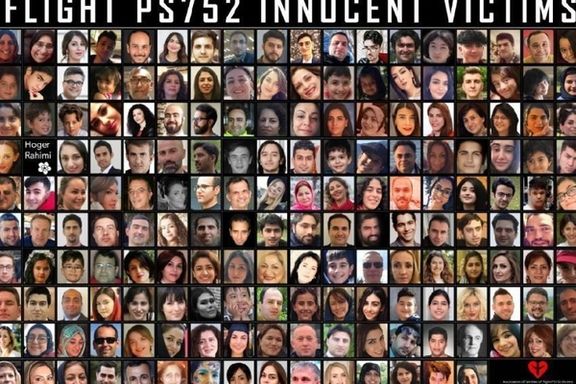
“The governments of the four other affected countries are not absolved of their responsibility to seek justice for their citizens,” the association said in a statement Monday. The group demanded the referral of the dispute to the International Court of Justice immediately after the end of the arbitration period, on June 28, 2023 as well as listing the IRGC as a terrorist entity.
More than three years after the incident, Iran's judiciary on Sunday sentenced the unnamed commander of the IRGC’s Tor-M1 surface-to-air missile system that shot down the plane to 13 years, of which he will be required to serve 10 years including the time he has already spent in prison. Nine others were also sentenced from one to two years.
Iran's foreign ministry spokesperson, Nasser Kanaani, on Monday insisted that Iran has carried out all its duties regarding the case “in accordance with the Chicago Convention” and its own laws and regulations, adding that families of the victims will be paid compensation.
According to Kanaani, there were 117 plaintiffs in the case who were represented by 20 lawyers during the trial. Defendants can appeal the ruling within twenty days from the time of being notified of the ruling, he said.
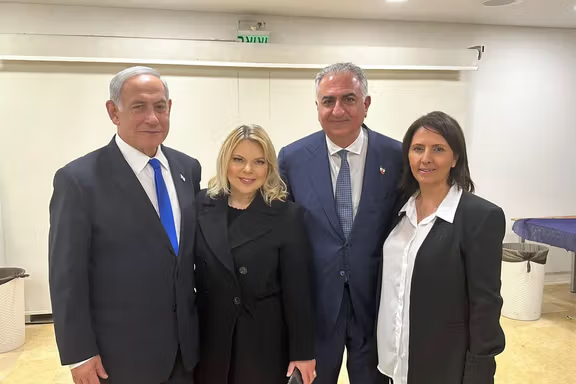
Prince Reza Pahlavi, a leading opposition figure visiting Israel, held a brief meeting with Prime Minister Benjamin Netanyahu Monday as he made a historic visit to Israel.
Pahlavi attended a ceremony held at the National Holocaust Memorial and Museum, Yad Vashem, as part of the Holocaust Remembrance Day. He stood alongside Netanyahu and Israel's President Isaac Herzog but did not deliver a speech. Later he held a meeting with Netanyahu in the presence of Israel’s intelligence minister Gila Gamliel.
This is the first time a prominent Iranian political figure has paid a public visit to Israel. Before leaving for Israel on Sunday, Prince Pahlavi tweeted that he wanted, “to deliver a message of friendship from the Iranian people…and pay respects to the victims of the Holocaust on Yom HaShoah.”
There are no reports so far about what Netanyahu and Pahlavi discussed during their brief meeting, but a photo showed the two deeply engaged in conversation.
The visit comes as Israeli officials and media commentators have raised increasing concern over Iran’s intensified efforts to create instability in and around Israel.
Speaking on Sunday at a memorial service, Israeli Defense Minister Yoav Gallant warned, “Iran is waging a multi-front war of attrition against the State of Israel,” adding that it was “continuing its attempts to establish itself on the northern front and at the same time sending its proxies to Judea, Samaria and Gaza.”
However, Gallant said that Israeli Defense Forces (IDF) have “acted and will continue to act in all arenas, in overt and covert operations along the border, across the border, and even far from the border.”
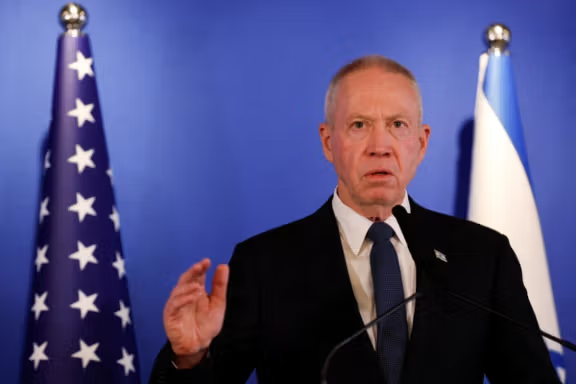
IDF is braced for possible attacks by Iran-backed militias, which launched several rounds of strikes earlier this month on Israel’s southern and northern borders. In an unprecedented development in recent times, the attacks originated from Syria and Lebanon as well as the Gaza Strip.
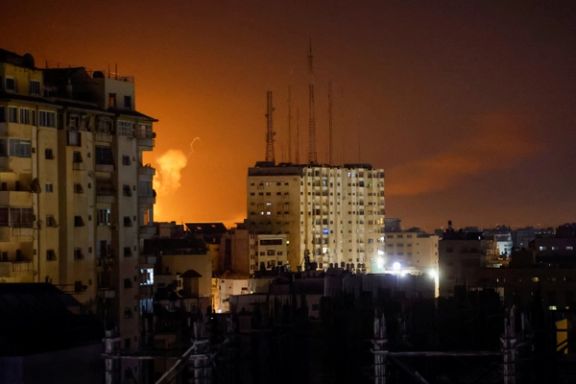
Analysts believe that the Islamic Republic intensified attacks by its allies and proxies in the belief that Israel is at a weak point, due to internal political unrest caused by Benjamin Netanyahu’s plans to overhaul the country’s judicial system.
On Sunday, the Jerusalem Institute for Strategic Studies published a statement, warning of the prospect of a war with Iran, and urging Netanyahu to suspend his judicial overhaul plan considering the intensified threats by Tehran.
“Israel is seen from the outside as a torn society, gradually losing its ability to function,” the think tank said, echoing last week’s remarks by former National Security Advisor and former Maj.-Gen. Yaakov Amidror.
“Israel’s enemies are gaining confidence and expect the internal conditions in the Jewish state to lead to self-destruction,” it added, warning, “The chances of a deterioration into a wider conflict are more significant today than before... Israel needs to prepare for the tangible possibility of war.”
Netanyahu, also speaking at Sunday’s memorial service, said that Israel must always be able to defend itself, adding that if other powers such as the US want to mobilize to help, that is good, “but we cannot build our national security on the foundations of others.”
His statement is indicative of Israeli concerns over Washington’s hesitation to help Israel militarily in case of a confrontation with Iran, especially considering the Islamic Republic’s recent détente with Saudi Arabia.
Also on Monday, Israeli Foreign Minister Eli Cohen held a meeting with American senior Republican Senator Lindsey Graham, who arrived in Israel from a visit to Saudi Arabia, stressing the need for strong Washington-Jerusalem coordination to prevent a nuclear Iran.
Netanyahu met with Graham on Monday and talked about Israel normalizing relations with Saudi Arabia, saying it would be a "giant leap" towards ending the Arab-Israeli conflict.
Netanyahu said, "We want normalization and peace with Saudi Arabia...This agreement could have monumental consequences, historic consequences both for Israel, for Saudi Arabia, for the region and for the world."
Cohen said, "Cooperation between Israel and the United States is necessary to stop the Iranian nuclear program, which is a global threat.
“The way to change Iranian behavior is through massive economic and political pressure, in every sector of Iranian interest,” coupled with a credible “military threat against it.”
Tehran turned to Lebanon’s Hezbollah to initiate the latest episode of its proxy war against Israel, during which Hezbollah fired a surveillance drone toward the Galilee on April 1 that was shot down by Israel. From April 5-7, Palestinians affiliated with Hamas and based in Lebanon fired fired 34 rockets at Israel. On April 8 and April 9, six rockets were launched from the Syrian side of the Golan Heights.
According to a report in The Wall Street Journal, prior to the most recent coordinated attacks, Esmail Ghaani, the leader of IRGC’s Quds Force, hosted representatives of Hezbollah, Hamas and Islamic Jihad – all of which designated as terrorist groups by the US and several other countries – at the Iranian embassy in Beirut in March and April.
On Saturday, spokesman of Iran’s Revolutionary Guard Ramezan Sharif said that the US is too weak to be able to militarily support Israel in the region.
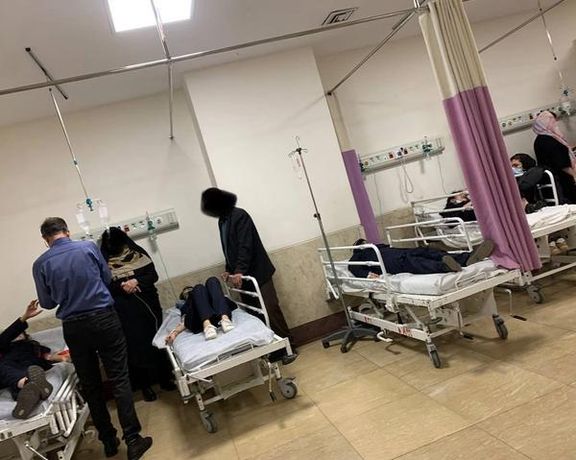
School students at schools across Iran have been targeted in a new wave of attacks using an unknown chemical substance, according to reports.
Videos seen by Iran International show the latest apparent poisonings have taken place in Alborz, Kermanshah, Kordestan, East Azarbaijan, West Azarbaijan, and Khuzestan provinces.
Families of students have staged protest rallies urging officials to hold classes virtually rather than in school to protect children from further attacks.
Hengaw Human Rights Organization said over 30 female pupils were admitted to hospital in the city of Kermanshah after the chemical attack, adding that the physical condition of some of them is critical.
Meanwhile, people in the southern city of Ahvaz gathered in front of the governor's office to protest against the serial poisoning of students.
The majority of the victims of the apparent poisonings are girls. The identity of the perpetrators is unknown.
Critics of the regime say the attacks are part of a crackdown on protests, a claim denied by government officials who have claimed the symptoms are the result of mass hysteria.
The current wave of chemical attacks began after the new year holidays.
Close to 300 schools were targeted in the past Iranian year ending on March 20 without any apparent serious effort by the government to identify and pursue the perpetrators, nor to explain to terrified parents and students what was happening.
Thousands of students have been affected, mostly girls, with hundreds hospitalized with symptoms including respiratory distress, numbness in their limbs, heart palpitations, headaches, nausea, and vomiting.
The Ministry of Islamic Guidance has sent a notice to the local media to censor the news related to the attacks.

Israel’s internal security agency has exposed attempts by Hezbollah and IRGC’s Quds Force to recruit Palestinians in the West Bank to conduct terrorist operations.
The Shin Bet was quoted as saying that a Hezbollah terrorist cell was identified trying to smuggle weapons into Israel. The weapons were meant to assist different criminal and terrorists' activities in the country.
Tel-Aviv-based i24 website reported Monday that according to the information the Iranian and Hezbollah officials transferred funds to two brothers named Yosef Mansour and Marsil Mansour who were arrested in the West Bank in recent months.
Shin Bet says the operation is a serious attempt by the Islamic Republic and its affiliates to infiltrate and establish cells in Israel to carry out terrorist attacks against citizens.
Earlier in March, Israel’s National Security Council released a statement, cautioning Passover travelers over the possibility of being harmed in Iranian plots abroad.
This year, the holidays – starting on April 5 – coincided with the Muslim fasting month of Ramadan, which usually sees a surge in terrorist attacks by extremist Islamists.
Israel’s National Security Council claims that Tehran will continue its attempts to harm Israelis around the world, especially in the countries near Iran in broader West Asia. It emphasized that Iran and its proxies present a particular threat in the United Arab Emirates, Georgia, Azerbaijan, Turkey and Bahrain, as well as Iraq’s Kurdistan region, where Israelis are prohibited to enter according to Israel’s own laws.

President Ebrahim Raisi should resign over his government’s failure to deal with calamitously high inflation, an Iranian lawmaker has urged.
Mostafa Reza Hosseini Ghotbabadi said: “Unfortunately, there is no will on the part of Raisi’s government to curb inflation, and basically they are not able to handle the situation.”
Speaking on Monday, he added: “Secondly, the head of government and his first deputy do not have the necessary expertise to make the right decisions regarding inflation and economic issues.”
Inflation is currently running at about 50%, with disastrous effects on the economy and leaving families struggling to survive.
Conservative lawmaker Ghotbabadi, an Iraq-Iran war veteran, said that the two years since Raisi came to power had shown his administration is incapable of getting to grips with the out-of-control inflation rate.
He said: "With the current procedures and functioning of the government and officials, we have to wait for worse things to happen in the economy.
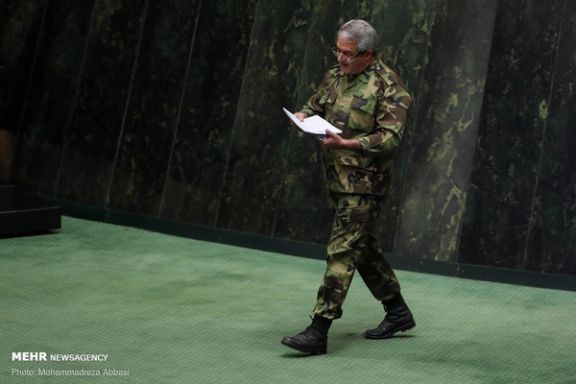
“Both government officials and MPs aligned with the administration ask us to give hope to the people and not tell them that the situation is bad, but we took an oath and according to the constitution we should speak up about the issues.”
He said that as soon as lawmakers warn about incompetent officials and ineffective management in projects and plans, hardliner supporters of the administration try to stop them via lawsuits and threats.
Ghotbabadi, a member of the parliamentary Industries and Mines Committee, said that the government has declined to cooperate with parliament since its early days in office. His remarks may seem surprising, given that many members of Iran's hardliner-dominated parliament are former members of the IRGC and would be expected to support the administration. But criticism of Raisi has been on the rise even among conservatives as the economic crisis worsens.
Echoing the Iraq-Iran war, when young volunteers walked through minefields to pave the way for other soldiers, the lawmaker said that if Raisi truly cares for the country, he should step on “the resignation mine” and step down along with his cabinet so that “a capable person with a strong team” could take charge.
Ghotbabadi said: “We are losing time and opportunities... We need a strong, powerful, wise and capable government.”
In July 2022, Ghotbabadi for the first time called on parliament to table a motion to unseat the President for incompetence, saying at the time that the Majles had been mulling the idea of Raisi's incompetence at least twice in recent months.
Earlier this month, Raisi replaced the head of the Planning and Budget Organization and the agriculture minister, after a year of calls by lawmakers and critics and amid skyrocketing inflation. The move came several days after Education Minister Yousef Nouri resigned following widespread discontent at a delay in the payment of salaries for teachers. However, pundits believe the changes are too little and too late.
On Monday, a motion to impeach Reza Fatemi Amin, minister of industry, mine and trade was registered at the parliament’s presidium after garnering 40 signatures.
However, the president seems unwilling to reshuffle the cabinet, according to statements he made during a meeting with a group of students on Sunday evening. This administration would not seek to replace managers unless it is absolutely necessary, Raisi said, adding that the government does not plan to make major changes in its roster.
The growing criticism of Raisi’s administration has gone far beyond the expected opponents of the regime to reach even media outlets affiliated with the Revolutionary Guard. IRGC’s mouthpiece Tasnim news -- which has been an adamant supporter of Raisi’s policies -- published an article on Sunday, questioning the government’s decision last year to eliminate food subsidies, saying that it boosted inflation.
Raisi’s administration moved to stop offering cheap dollars to importers of food and medicine in May 2022 to save more than $10 billion annually. Analysts say removing the indirect subsidy resulted in a massive hike in prices for most commodities including basic foods, medicine and medical equipment, animal feed and many other commodities.